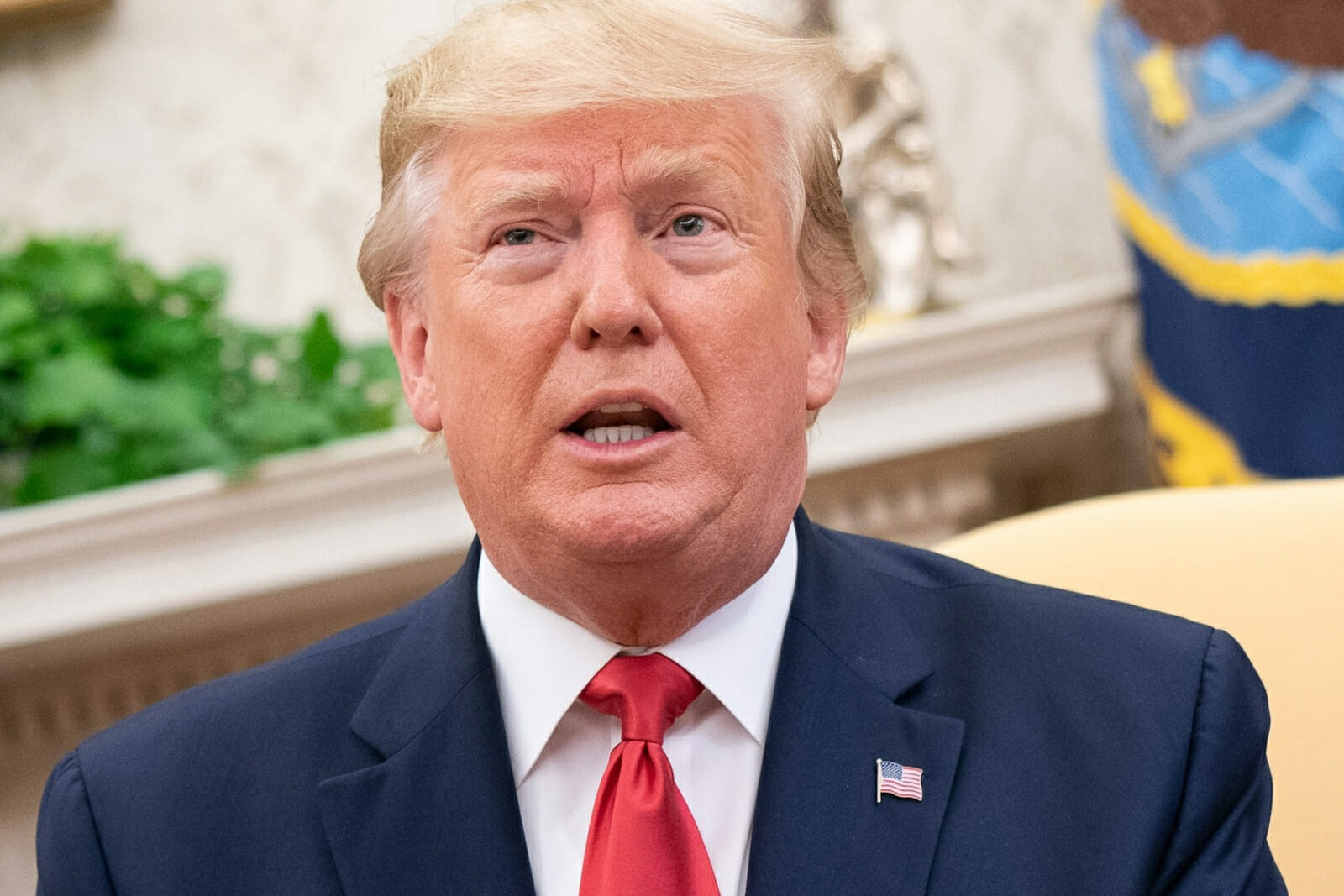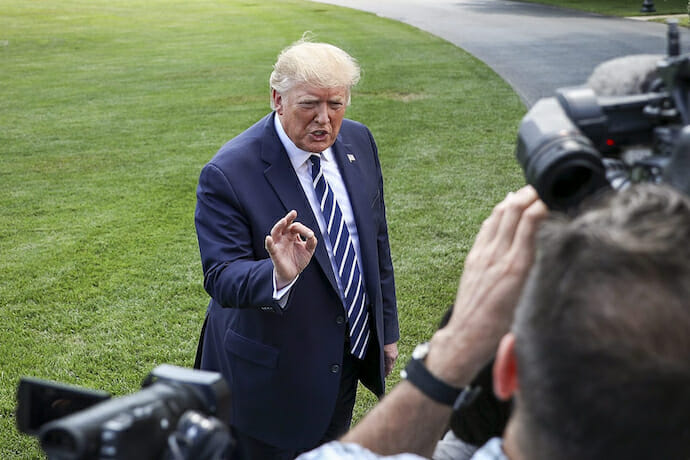
Politics
Anti-Trumpers’ Credibility Problem
Nothing predestined me to take up the pen to scorn Trump bashers – at the risk, which I willingly assume, of sounding like a member of the pro-Trump crowd. Not being a U.S. citizen or resident, I was initially inclined to stand aloof and watch the evolving tournament between the Washington establishment and maverick Donald Trump without taking sides, like someone who looks at an NFL or a Major-League game with interest but without a team to cheer.
Truth be said, I did have an initial bias: it ran against Trump. His style was – as it still is – too “unpresidential” for my taste: divisive, ill-mannered and sloppy. Moreover, the willingness he expressed throughout the 2016 presidential campaign to seek a rapprochement with Vladimir Putin’s Russia (“Wouldn’t it be great if the United States and Russia got along, combined, knocked out ISIS, maybe did other positive things?”) was, in my view, a debatable stance – and I explained why I thought so in an op-ed published at that time.
My initial predisposition, however, has repeatedly been unsettled by the incoherencies spouted by politicians, analysts and members of the mainstream media against the U.S. president.
“The Worst U.S. President Ever”
I still remember when and why my contempt for Trump-bashers began to take shape. It was the day of February 2018 when I read about a survey conducted among political “experts” that characterized Trump as the worst president in U.S. history.
That survey set off the alarm bells in my mind. As I questioned in an op-ed posted soon after that inquiry: “What had President Trump done so bad, which policy failures was he accountable for, which economic slump or recession had his policies brought about, which wars had he led to defeat or to entanglement, to deserve such an inglorious appellation after only 13 months of tenure?”
The ideological penchant of the analysts chosen for the survey undoubtedly contributed to the severity of that assessment: 57% of respondents declared to be Democrats, while only 13% identified themselves as Republicans. Ideological preferences, however, could not alone explain that slipshod conclusion: an irrational prejudice, improper on the part of political scientists, must have played, too, a major role.
Underestimating Trump’s political ability has been a widespread pattern in mainstream media, which led Financial Times’ Janan Ganesh (who, incidentally, is no Trump fan) to play the contrarian in a column with the suggestive title of “The Unexpected Effectiveness of Donald Trump.”
“Trump owned by Putin”
Long before the completion of the Muller probe, Trump bashers should have been less categorical than they were in referring to the Russia-collusion story. Indeed, not a few of the policies and measures taken by Donald Trump since the outset of this tenure ran counter to Putin’s interests and, therefore, could hardly have been adopted by Trump had Putin owned him (as would have been the case had the collusion narrative been true) – a point persuasively made by Ted Galen Carpenter in The National Interest. These facts, however, were flatly ignored by those who wished to believe in the conspiracy narrative as indisputable evidence.

More surprisingly, even after the conclusion of the Mueller probe – which, let’s recall, did not find sufficient evidence of collusion – there were still Democratic lawmakers (Adam Schiff, Raja Krishnamoorthi) and members of mainstream media who kept subscribing to the conspiracy narrative.
“Trump: The Friend of Dictators”
Anti-Trumpers recurrently argue that the U.S. president represents a menace to America’s democratic system and values. For them, there is no better proof of the validity of their contention than what they have described as Trump’s readiness to coddle dictators around the world – in particular, Xi Jinping, Vladimir Putin and, of course, Kim Jong-Un.
Forgotten in that invective is the fact that, as documented by Washington Post’s Marc Thiessen, Trump has been tougher with dictatorial regimes than former President Obama was.
It is thus little wonder that Cuban dissidents and Cuban-Americans, as well as Venezuelans suffering under the yoke of Chavismo, have praised Trump’s toughness against the dictatorial regimes that brutalize their respective countries.
Furthermore, Uyghurs confined in “reeducation” camps have received more support from the U.S. president than from both other leading democracies and Muslim leaders (in Turkey, Pakistan, Iran, Egypt and the rest) – as pointedly documented by political analyst Azeem Ibrahim, Director at the Center for Global Policy in Washington.
This has led political analyst Walter Russell Mead to conclude: “Even under the ‘America First’ president, universal values play a role in [U.S.] foreign policy.”
Meanwhile, David Ignatius of The Washington Post urges Democratic presidential hopefuls to get tough on Iran (“rather than seek only to restore the 2015 nuclear deal”), but they don’t seem to pay heed to that call.
Anti-Trumpers’ Economic Comedy
Nowhere has the credibility of Trump bashers been tarnished more than in the terrain of the economy. They have staged a shoddy, three-act comedy on this matter.
Act one. In June 2016 Larry Summers predicts that, if elected, Donald Trump would trigger a global recession within 18 months. Subsequently, House Democratic Leader Nancy Pelosi qualifies Trump’s Tax Cuts and Jobs Act as “the end of the world” and gives it the epithet of “Armageddon.”
Act two. Contrary to the dire warnings of Summers and Pelosi, the U.S. economy under Trump starts growing at a faster rate than during Obama’s tenure. Cue Obama in person to say that such a performance should be attributed to him and not to Trump’s policies.
This is hilarious. Throughout Obama’s presidency, Democrats and like-minded pundits did not cease to assert that the tepid growth registered during those years was due to an allegedly inherent weakness of modern economy (the so-called “secular-stagnation” theory). And yet, when faster growth achieved through Trump’s supply-side policies invalidated that pessimistic vision, anti-Trumpers led by Obama himself refuse to give credit to Trump’s policies for that improved performance.
Act three. The U.S. economy keeps breaking records of resilience. Unemployment falls to a five-decade low. Have progressives finally given Trump’s policies the credit they deserve? Of course not. They have, instead, chosen to play the underdog and claim that, with Trump, economic growth has only benefitted the wealthy and not the poor or the minorities.
Never mind that, as asserted by The Wall Street Journal and subsequently by The Economist, life is improving for the lowest paid in America. Nevermind that U.S. wages have been growing at the fastest pace since 2009, thereby beating expectations. Nevermind, finally, that unemployment among African-Americans and Hispanics are at, or near to, record lows. All that empirical evidence doesn’t seem to count in Trump-bashers’ economics.
To become credible, anti-Trumpers have their work cut out. Meanwhile, their incongruencies provide a goldmine of material for those who, like the author of this column, are on the lookout for topical issues to dwell on, write about, and laugh at.

